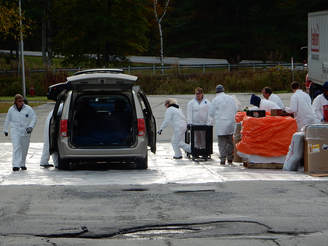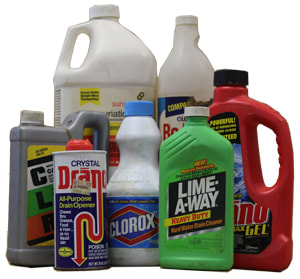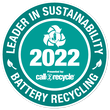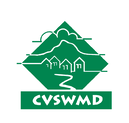Household Hazardous Waste
|
Household Hazardous Waste encompasses a variety of toxic household substances banned from the landfill.
To help you properly dispose of household and small business hazardous waste, we offer multiple annual events throughout the district from Spring to Fall. Collections are open to residents of member towns only.* Fees are $20 per car load. Hazardous waste from non-district residents is not accepted. If you live in a different town, please contact your local waste management district for information on HHW collections near you. Please note: Schools, towns, and small businesses must call two weeks ahead to pre-register for these events. Learn more at the State of Vermont's website. To register your organization for an event, call 802-229-9383. |
What is Household Hazardous Waste?
|
Consider anything labeled with the following warning words to be household hazardous waste and handle accordingly:
These items are dangerous to human and environmental health. They can be disposed of at Household Hazardous Waste collection events or at the Chittenden Environmental Depot year round. Make sure to store these items cool, dry, and out of reach of children. |
|
Some examples of Household Hazardous Waste include:
|
|
General Guidelines for Storing Household Hazardous Waste:
- Keep items out of reach of children and pets.
- If possible, store items away from living spaces.
- Make sure all lids and caps are tight to prevent the product and vapors/odors from leaking into living spaces.
- Keep items away from: heat sources (for safety), freezing temperatures (to prolong product life), and flood prone areas (to prevent contamination of water and soil).
|
What's the best way to handle hazardous waste? Create Less!
|
Broken Fluorescent bulbs? |
Household Hazardous Waste and Water
Proper storage and disposal of hazardous waste is essential to the long-term health of Vermont's soil, air, and water.
Hazardous products, pharmaceuticals, poisons, and non-bio-degradable products like wipes and sanitary products should never go in the toilet or down the drain. These chemicals and products end up in our waste water treatment plants and are difficult to remove. Many chemicals cannot be filtered out and end up passing through into the environment. After treatment, biosolids from wastewater treatment plants in Vermont are sometimes used for fertilizers and soil amendments on agricultural land, so it is especially important to keep hazardous or toxic products out.
You can read more about beneficial reuse of biosolids here.
Hazardous products, pharmaceuticals, poisons, and non-bio-degradable products like wipes and sanitary products should never go in the toilet or down the drain. These chemicals and products end up in our waste water treatment plants and are difficult to remove. Many chemicals cannot be filtered out and end up passing through into the environment. After treatment, biosolids from wastewater treatment plants in Vermont are sometimes used for fertilizers and soil amendments on agricultural land, so it is especially important to keep hazardous or toxic products out.
You can read more about beneficial reuse of biosolids here.




